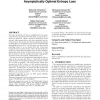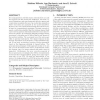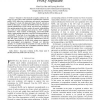50 search results - page 8 / 10 » A New Two-Party Identity-Based Authenticated Key Agreement |
STOC
2010
ACM
14 years 6 hour ago
2010
ACM
We study the problem of "privacy amplification": key agreement between two parties who both know a weak secret w, such as a password. (Such a setting is ubiquitous on th...
WISEC
2010
ACM
14 years 1 months ago
2010
ACM
Key management in wireless sensor networks does not only face typical, but also several new challenges. The scale, resource limitations, and new threats such as node capture and c...
STOC
1999
ACM
14 years 27 days ago
1999
ACM
Oblivious polynomial evaluation is a protocol involving two parties, a sender whose input is a polynomial P, and a receiver whose input is a value α. At the end of the protocol t...
CCS
2003
ACM
14 years 1 months ago
2003
ACM
To achieve security in wireless sensor networks, it is important to be able to encrypt and authenticate messages sent among sensor nodes. Keys for encryption and authentication pu...
GLOBECOM
2009
IEEE
14 years 3 months ago
2009
IEEE
—Demand for the femtocell is largely credited to the surge in a more always best connected communication conscious public. 3GPP define new architecture and security requirement f...




